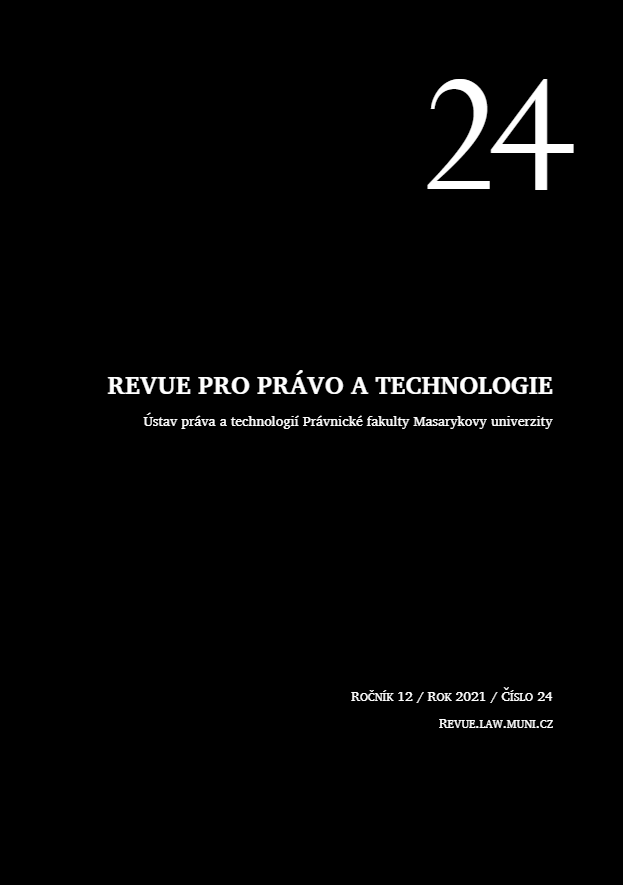
We kindly inform you that, as long as the subject affiliation of our 300.000+ articles is in progress, you might get unsufficient or no results on your third level or second level search. In this case, please broaden your search criteria.


With a continuous advance of technological development, we can observe their gradual introduction into the legal proceedings and court rooms where they fulfil different judge supporting roles. The extent to which this role can be expanded is not only technological, but legal question as well. The basic legal framework for any advances in judicial decision making is set mostly by the right to a fair trial. This right is then the primary focus of the work, analysing the impact of automation on the timeliness of proceedings, and access to a court. With the analysis of im- partiality and bias this work introduces technical aspects of these issues, following up with the analysis of the right to a public hearing and the remaining collection of fair trial rights. In the last category, the right to a reasoned judgement is to focal point. Jointly, these aspects represent the right to a fair trial and any form of technological advancement in this field must be compliant with it.
More...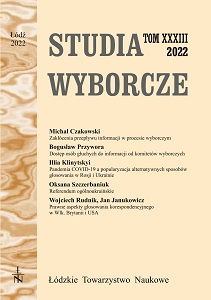
The article considers the impact of the COVID-19 pandemic on the increased interest of lawmakers in alternative voting methods (AVM) based on the example of solutions introduced recently in Ukraine and the Russian Federation. The analysis of the legislation of both countries leads to the conclusion that in the conditions of the epidemic, there has been a tendency to try to increase voter turnout and ensure the representativeness of election results by introducing AVM into election procedures using the tools offered by new technologies. In the situation of the epidemic, AVM turned out to be effective and safe forms of implementing the principle of direct elections, and at the same time no circumstances emerged showing that the AVM led to a distortion of the content of the votes cast by voters. In Ukraine, in the conditions of a pandemic, the Cabinet of Ministers decided to provide isolated voters with access to elections, guaranteeing them the possibility of voting in their place of residence. On the other hand, in Russia, it was decided to use: e-voting in Moscow and voting through a postal operator nationwide.
More...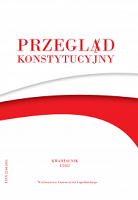
The article concerns the dilemmas of legitimising power in Poland, based both on the contemporary achievements of theoreticians and on a discussion of the realities of the political system in Poland. The analysis focuses on the assumption that, on the one hand, the legitimation of power is its recognition as legal, operating on the basis of applicable legal norms, and on the other, the recognition that a specific power has social grounds for having the rule. The legitimacy of power in Poland is based on the authoritarian experiences before 1989, the democratic transformation, and the crisis of constitutional democracy after 2015. The discussion is based on a reference to Montesquieu’s division of powers and an analysis of the legitimacy of the legislature, the executive, and the judiciary.
More...
The issue of the relations between the European Court of Justice and the constitutional courts of the Member States is a topic of great importance. The latest proof of that is the PSPP judgement of the German Constitutional Court. It has also shown what might happen if judicial dialogue is abandoned. The aim of the paper is to consider the consequences of the PSPP judgement as well as to analyse the conditions for the restoration and development of trust between the courts. The author presents the concept of ultra vires which has been used by the German Constitutional Court. In subsequent parts of the paper, the discussion focuses on the PSPP judgement and the surrounding scholarly debate and points out the consequences for both sides of the dispute. In the author’s opinion, the PSPP saga may, under some conditions, have positive implications for judicial dialogue.
More...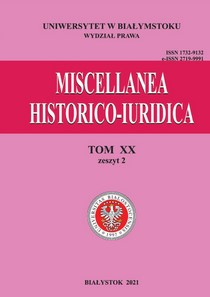
The Kingdom of Serbs, Croats, and Slovenes was created on December 1, 1918 by proclamation of Regent Alexander I Karadjordjevic. The most important step regarding the organization of the newly formed state was the adoption of the constitution. The first constitution of the newly formed state was adopted on June 28, 1921, and in science it is usually called the Vidovdan Constitution. Due to a series of internal problems, on January 6, 1929, the king suspended the Vidovdan Constitution, dissolved the assembly and banned the work of political parties, and justified the coup by the highest national and state interests. The transition to an open dictatorship did not solve any of the political, economic, or national problems that led to the crisis. Despite the fact that the king announced his return to the constitutional order as soon as possible, this would happen only after two years. With the enactment of the constitution on September 3, 1931, there was no democratization of Yugoslav society, but the king’s open dictatorship was replaced by a constitutional one. The existence of the Kingdom of Serbs, Croats, and Slovenes/Yugoslavia in the period 1918–1941 in a political sense, was marked by the changes of a covert and open dictatorship, whereby the proclaimed democratic rights and freedoms represented only a show for the public. Through the paper, the author will analyze those constitutional provisions and the king’s actions that indicate this.
More...
The principle “nullum crimen, nulla poena sine lege” is one of the core principles of German criminal law and constitutional law. However, the history of this principle is quite varied. This article will focus on an essential part of this history, namely on the version of this principle in the Weimar Constitution of 1919. It will be shown that the principle of legality of criminal law was indeed expressed in that constitution, but that the exact scope of application of this constitutional principle was quite unclear. In this regard, it was uncertain whether the Weimar Constitution also prohibited the retroactive application of criminal laws to those cases for which a more lenient penalty was provided at the time of the offense. This ambiguity of the Weimar Constitution finally became apparent in 1933 in the so-called Reichstagsbrandprozess (Reichstag fire trial). The issue in these criminal proceedings was whether the burning of the parliament building in Berlin (February 27, 1933) was punishable by death, although this sanction was not provided at the time the crime was committed. In this essay, it will be shown that the National Socialists had to go to considerable effort to be able to ignore prohibitions on retroactivity. This undermining of the principle “nullum crimen, nulla poena sine lege” forms an important example of the willingness of the legislature to negate essential protective principles of law in the Third Reich.
More...
The economic and social provisions of the Vidovdan constitution represent its most advanced part. Its introduction was a step forward towards the creation of a socially responsible state. However, their basic goal, increasing the cultural and economic well-being of the people, was not achieved and the economic crisis deepened. In the post-war state, burdened with cultural, religious, and national differences, the democratic constitution did not last long. The author tries to explain the factors that influenced the adoption of these provisions and their (non) implementation. Whether the failure of economic and social provisions was determined by the fate of the constitution or by objective facts is difficult to say. The author seeks to prove that the collapse of the constitution and its economic and social provisions was influenced by a number of unfavorable circumstances, such as the economic underdevelopment of the state, the remnants of feudal relations, political disunity, resistance to the new state, and Serbian hegemony. Using the historical-legal method of research, combined with economic and sociological methods, the socio-economic provisions of the Vidovdan Constitution and their implementation will be analyzed.
More...
Review of: A. Olechno, Ewolucja konstytucyjnych podstaw systemu rządów Ukrainy [Evolution of the Constitutional Foundations of the Government System of Ukraine], Białystok 2019, 290 pages
More...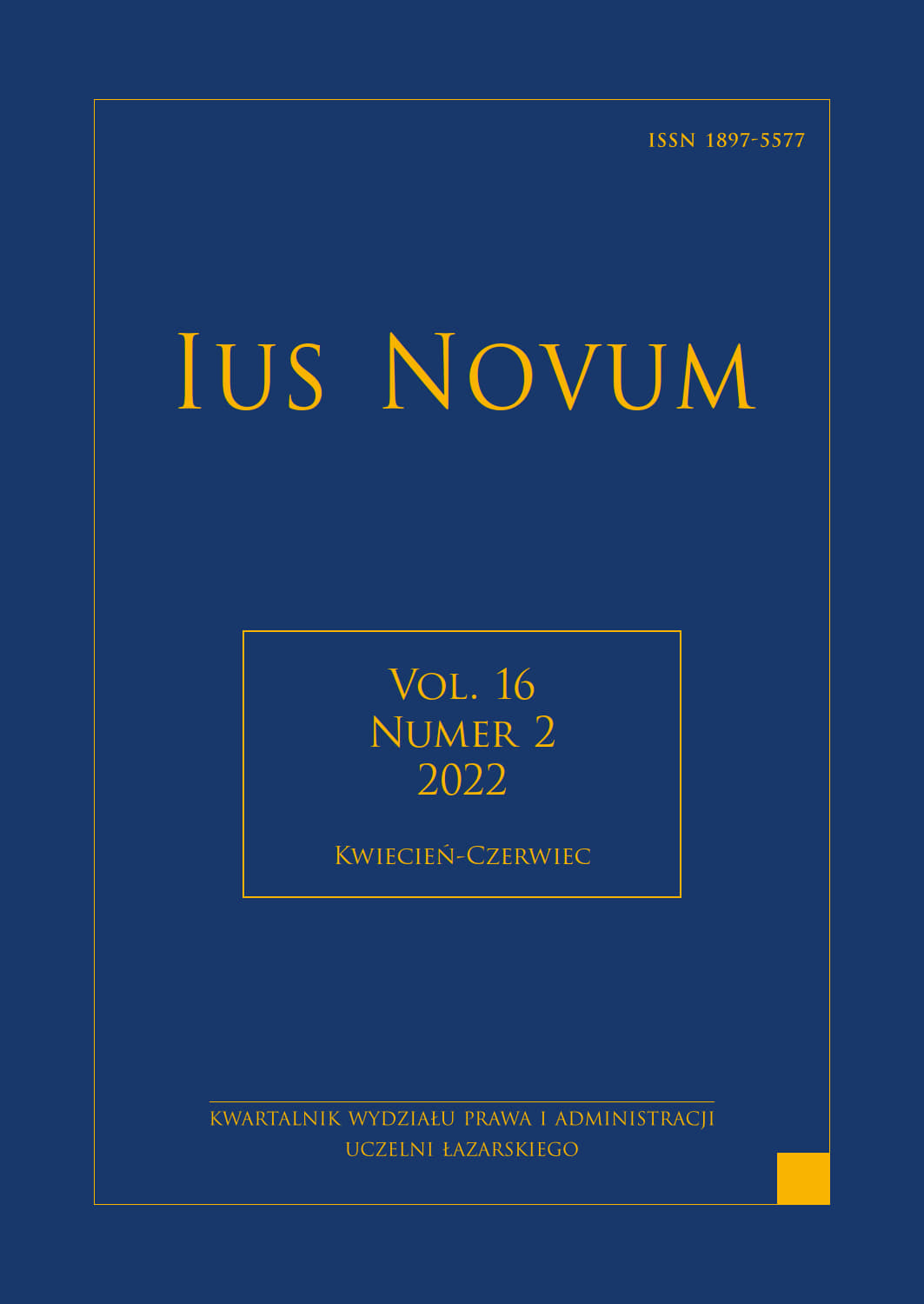
The article discusses the issue of the degree of social harmfulness of acts detrimental to goods obtained through immoral means (specifically, infringement of copyright to legally produced pornographic films). All film productions (also those of a pornographic nature) are works within the meaning of the Polish Act of 4 February 1994 on Copyright and Related Rights. The protection of rights to them is not limited by any moral assessments, but by objectively verifiable features of the work. For legal pornographic works, while their content itself may be regarded as controversial or even unacceptable from the point of view of social norms, theassessment of the social harmfulness of the act is determined not by their content but by the degree of the infringement of the object of protection. The moral assessment of the content contained in the work is irrelevant, if the content is in itself legal and disseminated lawfully, because the protection of non-property rights and, in particular, property rights to a work is not about the protection of the content of those works, but about the author’s rights. The finding that the act involved the dissemination of a someone else’s pornographic work cannot serve as a basis for considering the degree of social harmfulness of the offence as negligible. It is only the degree of copyright infringement that matters in the specific case
More...
The article discusses the statutory features of the offence of incest in the Polish Penal Code from 1997 (Article 201) and the results of empirical research carried out. Doubts were raised in doctrine about the rationalization of the prohibition of incest and the definition of the object of protection of this crime. The conduct that constitutes the actus reus as well as the subject and the subjective side of the offence of incest were also analysed. The research material was the files of cases under Article 201 Penal Code registered in all public prosecutor’s offices in Poland in 2013–2014 (389 cases). Research was intended to was primarily to identify the criminological picture of the offence of incest and its scale compared to total crime figures in Poland and the policy of punishing. The next aim of the research was to characterise the families, in which incestuous acts took place, and thus to answer the key questions in this context: whether incest is a factor determining the so-called family pathology or maybe it is a phenomenon conditioned by it and whether it occurs spontaneously or is connected with sexual violence in the family. The results of the research show that the so-called “regular incest” (voluntary on both sides), qualified only under Article 201 Polish Penal Code, is relatively rare in the practice of the judiciary. Most cases of incestuous sexual relations were combined with the crime type of sexual abuse of a minor or rape. These results seem to confirm the thesis that incest is rarely the only committed offence, but is most often related to domestic sexual violence. They also support the thesis that incest is a phenomenon conditioned by already existing family dysfunctionality, not its cause.
More...
The aim of this paper is to compare the American and European standards of the inadmissibi-lity of evidence of unlawful police entrapment. In US criminal procedure, which permits active forms of entrapment, the US Supreme Court and most federal courts apply a subjective test for the entrapment defense, focusing on the predisposition of the person provoked to commit the crime and, less often, an objective test examining the legality of government agents’ actions. The Strasbourg standard (including German cases) is based on two tests: a substantive one (examining both the predisposition of the person being provoked and the legality of the police actions) and a procedural one, which consists in verifying the reliability of the national courts' recognition of the charge of incitement to commit a crime by the police The basic difference between the analysed standards is to be found in the effects of illegal entrapment. In the US system, it is a justification to the perpetrator’s responsibility for a crime committed as a result of entrapment, and the Strasbourg standard allows for sanctioning the negative effects of such illegal evidence to be convalidated in criminal trial when the Court considers that “the trial as a whole was fair”.
More...
The paper covers the issue of accelerated penal procedure. It discusses conditions for application of this procedure under Polish law and presents them against the background of regululations in force in other countries, i.e. Germany, France, Spain, Portugal and Belgium. The assumption of the study was to assess Polish legal solutions and to demonstrate the basic differences and similarities between laws of each of afresaid countries.
More...
The copyright law enshrines the principle that copyright protection can be considered only in the case of works of human origin, which is mitigated in the Anglo-Saxon systems by introducing the category of computer-generated works. Nowadays we are dealing with a situation where, first of all, we are unable to precisely indicate the features of the subject of protection and copyright law grapples with an unresolved problem of distinguishing a work from other objects. Secondly, in the case of new phenomena such as the creation of AI, androids or cyborgs, there are difficulties with attributing the authorship of the work. This results in a too high level of uncertainty of legal effectiveness. The aim of the paper is to present the phenomenon of the work of cyborg artists in the context of the anthropocentric approach to the authorship of the work, which is dominant in copyright law. The central problem here is the question of the copyright status of works that arise as a result of shifting the boundaries of human possibilities.
More...
Liability for damage caused as a result of an aviation accident means first of all liability of an air carrier for damage done to passengers and liability of an aircraft user for damage done to third persons. However, it is also possible to impute liability to other entities, such as an aircraft manufacturer, a service institution, en entity managing an aerodrome, an institution providing air traffic services, or even aviation supervision authorities. The article analyses potential grounds for those entities’ liability. Liability of aviation personnel is not covered in the article.
More...
The article constitutes a comparative legal study of mediation based on for procedural regulations, i.e. Act of 6 June 1997: Code of Criminal Procedure, Act of 17 November 1964: Code of Civil Procedure, Act of 14 June 1960: Code of Administrative Procedure, and Act of 30 August 2002: Law on the Proceedings before Administrative Courts carried out with the use of a dogmatic method. The author analyses the solutions that, in his opinion, make it possible to propose a thesis on far-reaching convergence of the basic, and at the same time of normative provenance, principles of mediation. The principles include amicability, voluntariness (optionality), commonness, loyalty to parties, confidentiality and non-openness of mediation, as well as a mediator’s impartiality. The above-mentioned convergence does not mean complete homogeneity of particular solutions or their non-defectiveness, which is exemplified by Article 2591 CPC and Article 83 § 4 CAP. It is also shown that the domestic solutions are in conformity with the solutions recommended by the Committee of Ministers of the Council of Europe.
More...
The present study concerns the issue of suability of a rector’s decision on the suspension of a student’s rights. The author tries to define the appellate measures that a student has the right to use and the consequences of lodging them. The critical issue consists in the necessity to delimit a student’s suspension as a disciplinary penalty imposed as a result of a disciplinary proceeding conducted by the disciplinary commission in the mode and on terms specified in the Act on Higher Education and Science and appropriate application of the Code of Criminal Procedure and suspension as a result of an administrative decision issued by a university rector before the initiation of an explanatory proceeding or in the course of a disciplinary proceeding. The starting point was to define the legal nature of the relationship between a student anda university as an administrative institution managed by a rector. The considerations lead to the necessity to adopt a presumption that a rector’s decision in a case in question is a form of an administrative decision. Only the adoption of this optics leads to the reconstruction of appellate measures that enable a student - in case of those that are not final - to use non-devolutive appellate measures in the form of a motion to reconsider a case, which is classified as a horizontal instance, or a complaint to an administrative court in accordance with Article 52 § 3 Act on Proceedings before Administrative Courts. The legislator left the choice of the legal remedy to a student. A student still has the right to lodge a complaint about a final decision to an administrative court.
More...
The entry into force of Directive 2000/60/EC of the European Parliament and of the Council of 23 October 2000 establishing a framework for Community action in the field of water policy has introduced a new pricing system for water services. The Directive identifies the polluter-pays principle and the principle of cost recovery as a basis for action to be taken by the Member States when setting up pricing systems for water services. The provisions of Article 2(38) and Article 9 of the Directive raised questions of interpretation. The research issue of this study is to determine the discretionary scope of the Member States of the European Union for the protection of waters under a pricing system for water services, and to interpret the concept of “services” used in the Directive in the context of the cost recovery principle and the polluter-pays principle. The author, on the basis of the adopted research method, i.e., interpretation of law, views of legal academics and commentators, case-law of the Court of Justice of the European Union, states that the Directive provides for a mechanism whereby each EU Member State determines the individual uses of water in a pricing system for water services on the basis of a country-specific definition of “water services”. The pricing system for water services is only one of the legal instruments for setting the principle of cost recovery and the polluter-pays principle in the Member States’ water management system, and its scope is based on geographical, economic and natural criteria.
More...
In the ongoing climate crisis, more and more states of the world undertake initiatives that would reduce negative impact of dangerous growth of global average temperature, including droughts, drowning of coastal cities and water shortage. Recently, an ambitious idea to provide huge supplies of water for the population of the United Arab Emirates was initiated by one of Emirati businessmen – Mr Abdulla Alsheni, who plans to tow a huge Antarctic iceberg to the coast of Emirates. The plan itself is a logistic challenge, but at the same time may raise certain concerns on its compliance with international law. Hereby article has as an aim response to a question whether an act of towing an Antarctic iceberg would breach international law provisions, particularly those related to Antarctic Treaty System and law of the seas.
More...
This paper has discussed a variety of terms used in classical Roman law to denote land, namely: praedium, fundus, locus, possessio, villa, ager, solum. Apart from those, terminology used for land in the classical law period comprised: res quae solo continentur/tenentur (things related to land), res solo cohaerentes (things attached to land) or simply res soli (real property), while the term res immobiles, meaning real property, appeared in the sources of Roman law as late as in the post-classical period.The analysis of the selected sources of Roman law indicates that the scope of those terms was wider or narrower, which means that they sometimes coincided or overlapped, and as a result they were sometimes used interchangeably. The terminology in this respect fluctuated, and the scope of individual terms was being determined by Roman jurists when resolving individual cases. The preserved sources of Roman law indicate that although attempts were made to define individual terms used in respect of land, Roman lawyers did not fully develop a complete division of land into individual categories.
More...